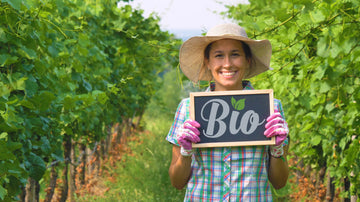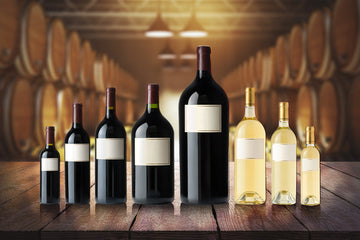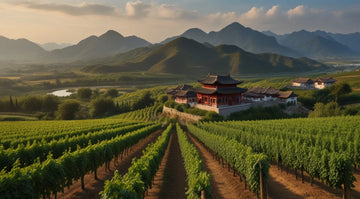有机葡萄酒、纯素葡萄酒和生物动力葡萄酒:有什么区别?
我们已经习惯在食品和饮料包装上看到“有机”、“纯素”和“生物动力”等术语,但当这些术语出现在葡萄酒标签上时,它们意味着什么?请继续阅读,了解占星术、蛋清和流浪母鸡与让您的葡萄酒更健康有何关系。
有机葡萄酒

也许像越来越多注重健康的人一样,您已经开始研究有机农产品。当您想到有机水果和蔬菜时,您会想到什么?香蕉和油桃、黄瓜和胡萝卜都是在不使用可能有害的杀虫剂、肥料或除草剂的情况下种植的,对吗?
嗯,这就是有机葡萄酒;葡萄是在没有有毒保护物质或生长诱导物质的帮助下种植的。
有时,您可能会看到有机葡萄酒含有亚硫酸盐,但这是完全自然的,是葡萄酒发酵过程的结果。不过,有机葡萄酒中不会添加亚硫酸盐来阻止氧化,而氧化是标准葡萄酒生产的一部分。
有机葡萄酒味道如何
那么有机葡萄酒的味道如何?您认为有机霞多丽或黑皮诺的味道会更好、更差还是类似?答案是,您最喜欢的品种,虽然是通过有机工艺酿成的葡萄酒,但味道与以常规非有机方式酿造的葡萄酒相同。虽然原料,即葡萄,可能比用杀虫剂处理等种植的水果质量略高,但葡萄酒的味道很大程度上取决于葡萄在收获后进入酿酒厂时的情况。酿酒师有点像用葡萄进行创作的艺术家。他或她有多种选择,可以将有机种植的葡萄酿成消费者喜欢的葡萄酒。
有机葡萄酒有其益处,就像食用有机农产品也有其好处一样;你可以降低接触令人不快的化学物质的风险,从而可以更加享受杯中的美酒。
与其他产品一样,如今,如果您的葡萄酒是有机的,通常会被吹嘘一番,因此在标签上找到对此事实的提及应该不难。此外,许多国家都有官方认证机构批准有机生产标准。如果葡萄酒已获得当地组织的批准,则标签上应该会有一个印章。如今,许多葡萄酒生产国都生产有机葡萄酒,因此,如果您想喝这种天然葡萄酒,稍加探索就会发现一些有趣的东西。
酿酒师如何酿造有机葡萄酒
葡萄园中的一种有机做法通常会导致另一种有机做法。这可能包括使用堆肥来吸引有利于葡萄树健康的昆虫,为当地野生动物的栖息地提供条件以防止它们吃掉葡萄,允许母鸡在葡萄园周围漫步以给环境增添自然气息,以及在耕作时使用生物柴油拖拉机。这些葡萄园做法都考虑到了更大的前景并支持可持续农业,这是有机农业日益增长的一个特点。
素食葡萄酒

你可能会问,葡萄酒怎么就不能是素食呢?毕竟,它是用发酵的葡萄酿造的。但你知道,当你评价一杯葡萄酒时,你必须考虑的一点就是它的清澈度吗?
这是有原因的。如果任其自然,葡萄酒最终会在瓶中和玻璃杯中变得浑浊。这是由于发酵过程。糖被转化为酒精,从而产生葡萄酒。这也导致液体中漂浮着多种分子。这些分子可能是酚类物质、单宁或酒石酸盐。它们喝起来无害,但看起来不太好看,所以在装瓶之前,葡萄酒要经过一种叫做澄清的过程。这是去除液体浑浊的过程,通过使用澄清剂来实现。
一些酿酒商已经接受了这一举措,以便进入不断增长的素食市场,并在澄清过程中使用非动物产品。
此类药剂通常含有蛋清或牛奶蛋白等动物产品,这些物质都具有很强的吸引分子云的能力,因此可以轻松地将它们从葡萄酒中提取出来。
虽然这些物质在葡萄酒中残留的量非常少,但严格来说还是有痕迹的,因此它不是纯素食。一些酿酒师已经接受了这一点,以便进入日益增长的纯素食市场,并在澄清过程中使用非动物产品。这些包括粘土或植物材料。有些甚至在葡萄酒中留下发酵沉淀物,让它们自然沉淀。
生物动力葡萄酒

这种酒非常有趣,而且非常奇怪,但这是好事!首先,你听说过鲁道夫·约瑟夫·洛伦兹·施泰纳吗?这位迷人的人于 1861 年出生在当时属于奥匈帝国、现为克罗地亚的地区。他是一位博学者,研究和写作教育、灵性、哲学、艺术、社会改革……等等。
斯坦纳与葡萄酒的联系在于生物动力农业领域,这一实践已扩展到葡萄种植。生物动力农业源自斯坦纳的理念,它考虑了整个生长生态系统——土壤健康、星体位置、月相、占星术以及各种可能被视为古怪、神秘和深奥的习惯。
许多在葡萄园内实施生物动力工艺的酿酒师表示,这样可以生产出更好、更健康的葡萄。
土壤健康是生物动力葡萄栽培的一个基本方面。葡萄园中会根据天体运动,精心定时地施用各种草药和堆肥。
但问题是,它确实有效!许多在葡萄园内实施生物动力法的酿酒师表示,这种方法可以生产出更好、更健康的葡萄。这其中一定有好处,因为法国、瑞士、意大利、西班牙、奥地利、德国、澳大利亚、智利、秘鲁、南非、加拿大和美国都在实行生物动力法酿酒。它甚至有自己的标准和认证组织:Demeter International。
采用生物动力法酿造的葡萄酒有时会有点浑浊或看起来有点自然,因为在酿酒过程中不使用澄清剂,而且它们通常口感丰富、果味浓郁。干杯!
有机、纯素和生物动力葡萄酒将继续存在,所以开始探索并享受旅程吧!













